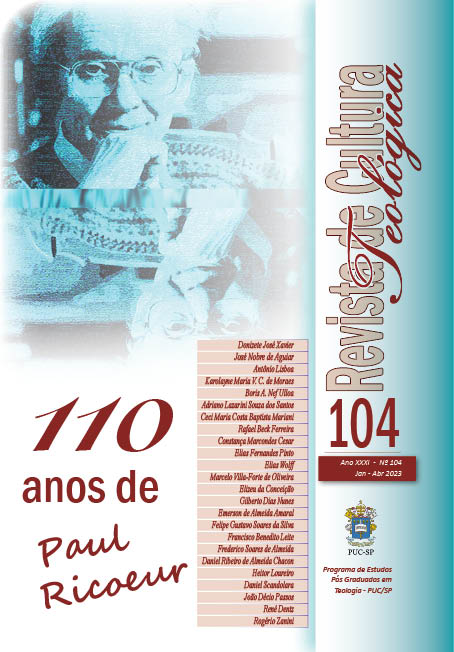A Redenção e Perdão pela Superabundância
a filosofia de Ricoeur de inspiração teológica
DOI :
https://doi.org/10.23925/rct.i104.60605Mots-clés :
Esperança, Graça, Redenção, Superabundância, PerdãoRésumé
É possível abordar o pensamento ricoeuriano em um diálogo com temas teológicos, embora cientes da advertência feita por ele a respeito do cuidado em se estabelecer os limites e aproximações entre a teologia e a filosofia. A propósito, Ricoeur sempre recusou a etiqueta de “filósofo cristão”, procurando manter equidistantes a sua confissão de fé e o procedimento filosófico. Como consequência, o grande fundamento da reflexão ricoeuriana é a filosofia, embora a teologia, sobretudo através de seus estudos de exegese bíblica, também ocupe um respeitável lugar em suas pesquisas. Alguns temas são “limítrofes” entre os dois saberes, notadamente o mal, a esperança e o perdão. Este é visto por ele como uma síntese entre a história, a memória e o esquecimento. No entanto, além disso, também não pode ser pensado sem o mal e a esperança. Ou seja, apesar de nosso autor não ter elaborado uma “vertente teológica” de seus estudos sobre o perdão, como o fez em relação ao mal e à esperança, não é possível estudar a temática sem levar em consideração sua inspiração e sua abordagem teológica. Ora, Ricoeur sempre esboçou, no âmbito de suas argumentações, a percepção do sagrado e os desdobramentos no campo da fé, inclusive como pregador ocasional na capela Rockefeller, da Universidade de Chicago.
Références
Paul Ricoeur. Le conflit des interprétations: essais d´herméneutique I. Paris: Editions du Seuil, 1969.
Paul Ricoeur; Emmanuel Lévinas; La Révélation. Bruxelles: Facultés Saint Louis, 1977.
Paul Ricoeur. La Bible et l´imagination. Revue d´histoire et de philosophie religieuses, n. 62, 339-360, 1982.
Paul Ricoeur. Soi-même comme un autre. Paris: Seuil, 1990.
Paul Ricoeur. O Si-Mesmo como um Outro. Campinas: Papirus, 1991.
Paul Ricoeur. La Vie chrétienne, Journal de l´Église presbytérienne au Canada, n. 41, 4-6, 1992.
Paul Ricoeur. Lectures 3: Aux fronteires de la philosophie. Paris: Seuil, 1994.
Paul Ricoeur. La critique et la conviction. Paris: Calmann-Lévy, 1995a.
Paul Ricoeur. A crítica e a convicção. Lisboa: Edições 70, 1995b.
Paul Ricoeur. Refléxion Faite. Esprit, 1995c.
Paul Ricoeur. Penser la Bible. Paris: Seuil, 1998.
Paul Ricoeur. A Hermenêutica Bíblica. São Paulo: Loyola, 2006.
Paul Ricoeur A memória, a história e o esquecimento. Campinas: Editora Unicamp, 2007a.
Paul Ricoeur. Vivant jusqu´à la mort. Suivi de Fragments. Paris: Seuil, 2007.
Paul Ricoeur. O justo 2: justiça e verdade e outros estudos. São Paulo: Martins Fontes, 2012.
François-Xavier Amherdt. L´herméneutique philosophique de Paul Ricoeur et son importance pour l´exégèse biblique. Paris: Les Éditions du Cerf, 2004.
Bárbara Andrade. Pecado original... ou graça do perdão? São Paulo: Paulus, 2007.
Boyd Blundell. Paul Ricoeur between theology and philosophy: detour and return. Indiana: Indiana University Press, 2010.
Vincenzo Di Matteo. Ricoeur entre a crítica e a convicção. III Encontro Interinstitucional de Filosofia Recife, 2005.
François Dosse. Paul Ricoeur: les sens d'une vie. 3. ed. Paris: La Découverte, 1997.
Peter Kenny. Memory, Narrativity, Self and the challenge to think God: the reception within theology of the recent work of Paul Ricoeur. Cambridge: Cambridge University Press, 2004.
Maria Luci Buff Migliori. Horizontes do Perdão. Reflexões a partir de Paul Ricoeur e Jacques Derrida. São Paulo: PUC-SP, 2007.
Téléchargements
Publié-e
Comment citer
Numéro
Rubrique
Licence
© Revista de Cultura Teológica 2023

Cette œuvre est sous licence Creative Commons Attribution - Pas d'Utilisation Commerciale - Pas de Modification 4.0 International.
Os autores concedem à revista todos os direitos autorais referentes aos trabalhos publicados. Os conceitos emitidos em artigos assinados são de absoluta e exclusiva responsabilidade de seus autores.

